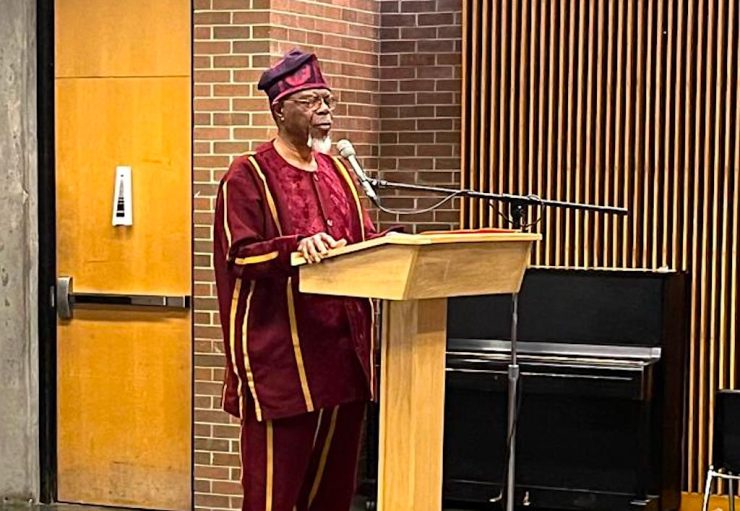As an undergraduate student who (un)fortunately finds himself in the field of history, I have heard and read quite much about Professor Toyin Falola and his works. He, undoubtedly, was part of the reasons I thought I had entered “one chance” during my early undergraduate studies. The mantra “No first class in history” and the many books I had to read to survive as a history student—a course I had no elementary knowledge about—were my greatest concerns. Falola’s books represent about 20% of those voluminous books I see on the history shelves in my university library; his books account for much of the references we receive from lecturers and predecessors. Also, 50% of contemporary African history books have Falola ascribed as either author, co-author, or editor, or his works are rather cited. So, I consistently asked myself, “how would I get to read all these history books if I could not even count the number of books written by one individual?” After all, what is worth doing at all is what doing well! Moreover, the professor would not stop entertaining us with those article series he consistently publishes across media, all of which I ensure I read. Before the readership imagine my personality as Ika, whom, as Falola described, are “so interested in demolishing, damaging, and destroying what has been strenuously achieved by others for a very long time”, let me dedicate the second part of this piece to eulogize the great scholar.
I absolutely agree with the South African professor and Dean, Faculty of Law, at the University of Free State, when he posited that Professor Falola would have bagged the status of an Orisa, had he “came at the early time of Yoruba civilization.” His enormous contributions to the field of African history would have transmogrified him into becoming what was left of Sango, the god of thunder. There is virtually no aspect of African history which Toyin Falola has not dissected. From political history to economic history, and religion to philosophy and sociology, Falola has attained a landmark that no contemporary academic has reached. With over 200 journal articles and book publications—single-authored, co-authored, and edited—the Iwin of Africa has contributed to the field of history such that, if his books alone were to be left for history students, they cannot finish exhausting it throughout their four years of undergraduate studies. Amazingly, Falola has not retired! A more amazing attribute of Professor Toyin Falola is his “Africanness.” Falola is so emblematic that he could not stop showcasing the quality and beauty in Africa’s Aso Ofi. I will not be exaggerating to assert that I have not seen Falola in an English attire. The first time the Professor was invited by my department, the Department of History and International Studies, Lagos State University, for its first distinguished lecture series, I was expecting to see the Texas professor fully dressed in an American outfit. The reverse was the case. His second appearance in the university in October, last year, was no difference. This signifies the conservativeness of an African scholar, who does not only write but also walks the talk. I am aware the scholar has continued to advocate for writings in indigenous languages in Africa. Falola is so African!
Close at hand is his embodiment of social values. A scholar who loves and respects both the young and old, Professor Falola does not underrate anyone. He mentors available students irrespective of status. An epitome of humility, Falola honors every academic call as a service for humanity, delivering lectures at various foreign and local institutions. I was forced to ask if he was no longer a professor at the University of Texas; Falola is more Nigerian than the home-based. It could not have been money. Falola’s humbleness is reflected in his allowing poor students who struggle to take pictures with the global scholar. His friendliness and hospitality, no doubt, are influential in his publications on various Nigerian slang: Woro si Woro, Ayamatanga, Omokomo, Fokasibe, Ijoba, Mummy: Let the Singles Breathe! Igbo, among others.
In sum, Professor Toyin Falola is an all-rounded African scholar whose impacts on African literature, politics, economic and religious histories cannot be fully appreciated in an article such as this. The professor is, inarguably, a Big Fish. I realised this fact in October last year, upon completing a review of Falola’s lecture titled “Beyond Sectarianism: Harnessing the Socio-religious and Political Values for a Greater Nigeria.” His comments, “I enjoyed the review” saw me rejoicing like a presidential candidate who had just won an election. In other words, Falola is to history students as Lionel Messi is to football. Although the professor may not apologize for compelling us (history students) to read his numerous books, he has made us realize that the field of history is not for lazy students. I join other scholars to celebrate Professor Toyin Falola on his 71st birthday. Keep making us proud, Professor!
Abdulkabir Muhammed is of the Department of History and International Studies of the Lagos State University. He can be reached via abdulkabirm87@gmail.com













